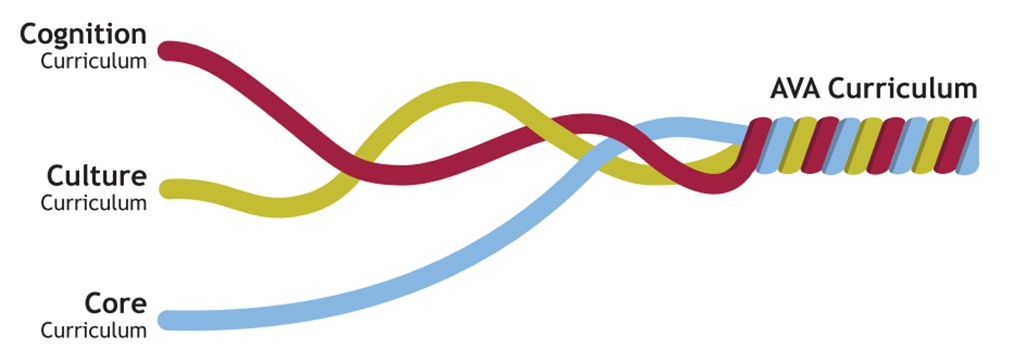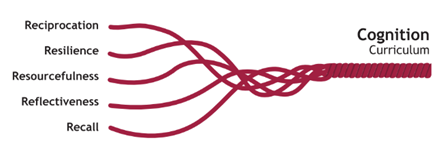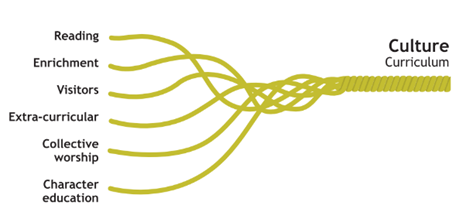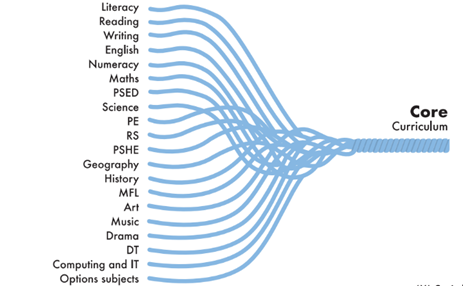
PERFORMING ARTS - DRAMA
» The Drama Team
» Curriculum Intent
» Extra-Curricular Activities
The Drama Team
Subject Lead
Miss Z Convery zconvery@theacademy.me
Teachers of Drama
- Mrs K Cousins
Curriculum intent

Cognition Curriculum

Recall is at the forefront of our planning as through the spiral curriculum students are asked each lesson to recall and use prior knowledge about specific techniques, skills or styles in order to use them in their practical work. At KS4 recall is planned for especially when teaching our written exam as this is very different to the practical work students have been doing up until this point, different ways of getting students to remember structures for exam questions, key terminology and key facts have been explored in our written SOWs and we have then reflected on which ones worked best and improved them for future students.
Resourcefulness and Resilience are planned for in our set up of our classroom environments with interaction displays to provide students with a variety of resources to help them if they are stuck, thus encouraging their resilience to not give up and find solutions. The design of our overall curriculum within each year group means that students are able to look or think back to previous terms’ work and incorporate that into the new term as each new term links back to and draws on the knowledge in the previous.
Resilience is also crucial in our teaching of devising to all year groups as we introduce the idea very early on that there are multiple ways to devise and we plan for students to experience all the different methods so they can pick and choose which methods suit them and their peers, understanding that not everyone will work in the same way is crucial for productive and positive group work.
Reciprocation is crucial in Drama as we heavily rely on students being able to work within groups, this is planned for according to the topic being studied as group sizes and task will vary depending on the lesson. Students are given clear expectations in their first lesson that they need to be able to work with everyone in the class throughout the course of the year, this also ensure resilience is fostered from the start when students perhaps do not know everyone in their class. Some groups will often be used as models of good group work. The structure of our lessons through the building blocks also ensures that all student are able to achieve according to their different abilities and that they can experience the whole lesson as part of a group if not through their own individual contributions.
Reflectiveness is key in every practical lesson at KS3 as feedback is delivered verbally each lesson either through whole class feedback after a performance, peer assessment or self-assessment. Students are often given a focus for their feedback e.g. your feedback needs to focus on their use of characterisation and proxemics. This makes sure that their reflections are focussed and purposeful, this further develops resilience as students are praised for specific ways of work or use of skill rather than just for ‘trying hard’ which doesn’t explicitly tell them what they’ve done correctly.
CULTURE CURRICULUM
 The Cultural Curriculum in Drama is integral to our progression, success, and harnesses and enthuses student’s interests and passion for Drama, we have many opportunities in Drama to develop our student’s cultural capital through our extra-curricular provision and our regular workshops and trips as well as school productions. Giving our students the platform to express themselves is part of what we do. Examples of the cultural curriculum include:
The Cultural Curriculum in Drama is integral to our progression, success, and harnesses and enthuses student’s interests and passion for Drama, we have many opportunities in Drama to develop our student’s cultural capital through our extra-curricular provision and our regular workshops and trips as well as school productions. Giving our students the platform to express themselves is part of what we do. Examples of the cultural curriculum include:
- Drama Workshops- workshops- Inviting in Industry Professionals to deliver- ex- Frantic Assembly.
- Regular Theatre Trips.
- Theatre Tours to allow our students behind the scenes of a Professional Theatre.
- School Productions- Our Enrichment delivery often links to upcoming productions.
CORE CURRICULUM

KS3: Our curriculum at KS3 has close links to GCSE Topics. The specific topics through which we teach the different skills, techniques and approaches are chosen based on teacher strength and interest as this enables the most passionate and innovative teaching in our subject. - In Year 7 the first script we explore is Roald Dahl, as this is an author, we think most students will be familiar with and therefore they will be able to create characters based on their own reading of the books or viewing of the films. The main purpose of this introduction to scripts is so students can understand how to form and present different characters, so using familiar stories really benefits students in developing these performance skills and their confidence. - The Drama techniques they are taught later in the year are selected as they are commonly used devising techniques for students recognised by the exam board and often used at GCSE level to help develop and create a performance. A basic understanding of these also introduces students to a contemporary style of performance known as non-naturalism, so they understand that not all performance has to be naturalistic. - At the end of the year we further develop their understanding of non-naturalism by studying Greek choral storytelling, this is to introduce the concept of the ensemble to once again enable students to understand how every member of a group plays a vital role in the performance and to teach team work further through this concept. - This is then continued at the start of their second year at KS3 when they study an ensemble script. Here they are taught more in-depth ensemble techniques based on GCSE practitioners that they may go on to study, to enable them to understand how they can use this style across devising and scripted performances.
The topics at Year 8 are taught over a full term to allow for a more in depth look and to give students more time to explore and develop their study. When devising in Year 8 they are introduced to the concept of stimuli, something that they will need to be familiar and confident with for their first GCSE practical exam. They are taught how to approach stimuli, different ways they can devise from a stimuli and then are given time to explore these approaches more independently. - We end KS3 on the study of a script to reintroduce students to more naturalistic acting as they have spent a long time exploring non-naturalism. We often find our GCSE students prefer to perform in the style of Naturalism for their scripted exam, so this is why we return to this style for their final script study, preparing those who have selected Drama GCSE but also reminding all students how to infer meaning from a text – a skill which is useful to them across many subjects.
KS4: The GCSE curriculum is chosen based on the requirements of the course. Component 1 - students must create a devised performance using a specific practitioner or style; they also have to complete written work of a portfolio and evaluation. - In Year 9 we split the year up so that each class covers at least 2 contrasting styles/practitioners. Although the focus is mostly on practical work students will complete an evaluation based on a performance, they have done so that the teacher can assess their theoretical progress. - In Year 10 these are revised in the first half term, as the C1 exam happens later this year. Component 2 requires students to perform scripted extracts, again within in specific style or practitioner. This takes place in Year 11. - In Year 9 students will have some exposure to working with a script and the different approaches to take. - In Year 10 students complete a C2 mock before Christmas so they become familiar with the process ready for Y11. Component 3 requires students to sit a written exam, Section A is based on their set text where they must answer questions related to a chosen extract, Section B is a live theatre question. - Throughout Years 9-11 students are taken to see live theatre and will then reflect on the performance and practice a Section B question based on the performance they saw, so they know what to expect by the time the exam happens in Year 11.
Extra Curricular
Extra-Curricular activities are an important part of any Drama and Music faculty. There are many opportunities for students to develop their interest in Drama outside the classroom.
In December we put on our Winter Production of A Monster Calls, which had great success and reviews. Alongside a winter play, we also have a full-scale school musical production that is put on every year. Previous productions have included- Grease, We Will Rock You, High School Musial, Hairspray, Bugsy Malone, Joseph Cats and Back to The 80’s. We also have a weekly Dance club that runs after school open to students from all years and levels of experience.
Throughout the academic year there are several opportunities to watch professional productions at Theatres in Buckinghamshire and London. Performing Arts at Aylesbury Vale Academy is a popular option choice at KS4.
